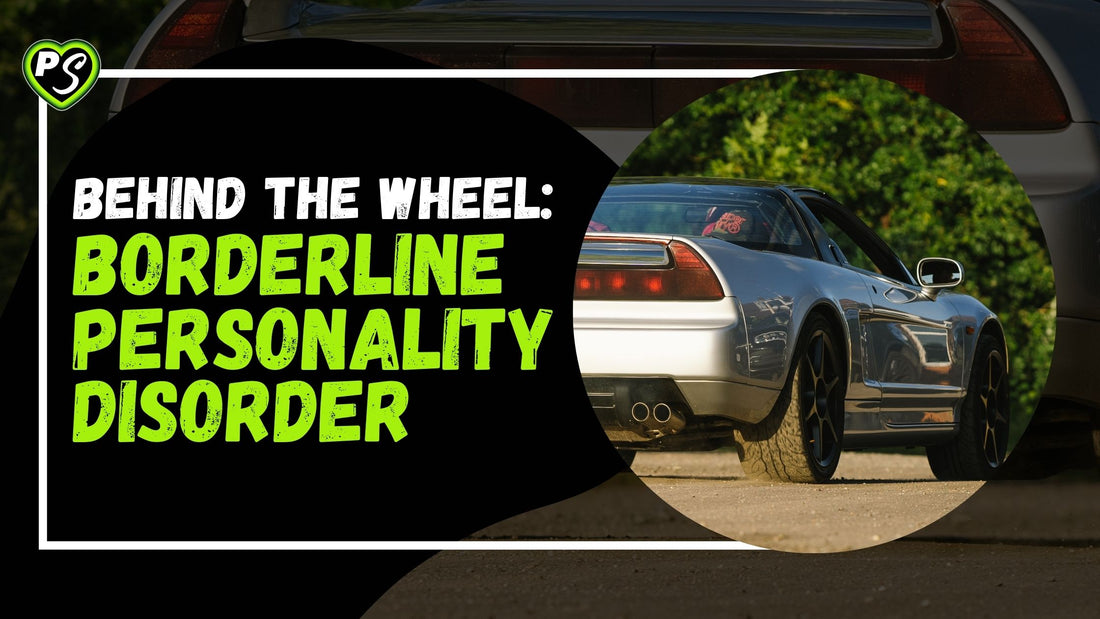
Share
(BTW) Understanding BPD: A Comprehensive Guide
JDMClareBorderline Personality Disorder (BPD), also known as Emotionally Unstable Personality Disorder (EUPD), or Emotional intensity disorder (EID), is a complex mental health condition that profoundly affects how individuals perceive themselves and interact with others. People diagnosed with BPD often struggle with intense emotions, unstable relationships, and a fragile sense of self. This guide aims to provide a comprehensive understanding of BPD, including its symptoms, diagnosis, and available support options.
Borderline Personality Disorder Briefly Explained: BPD is a condition characterised by pervasive patterns of thought, behaviour, and emotions that significantly deviate from societal norms, causing distress or impairment in functioning. Individuals with BPD typically experience difficulties in regulating their emotions and maintaining stable relationships, leading to significant challenges in daily life.
Spectrum of Symptoms
BPD is primarily characterised by a range of distressing symptoms and challenges in emotional regulation, self-image, and interpersonal relationships. However, it's important to note that individuals with BPD are not defined solely by their symptoms, and they will also possess positive qualities and strengths. While these strengths may not be considered "symptoms" in the traditional sense, they represent aspects of individuals' personalities and capabilities that should be acknowledged and appreciated. A combination of symptoms are briefly detailed below.
Intense and Rapidly Shifting Emotions: Individuals with BPD often experience emotions intensely and may have difficulty regulating them. Mood changes can be sudden and extreme, ranging from intense happiness to profound sadness or anger within a short timeframe.
Passion and Intensity: While intense emotions are a hallmark feature of BPD, they can also be channelled into positive outlets. Individuals with BPD may exhibit passion and intensity in pursuing their interests, goals, and relationships, leading to meaningful experiences and accomplishments.
Fear of Abandonment: There is a pervasive fear of abandonment or rejection, leading to frantic efforts to avoid real or imagined abandonment. Individuals with BPD may become overly dependent on others, or engage in impulsive behaviours to maintain relationships.
Empathy and Compassion: Despite their own struggles, individuals with BPD can demonstrate remarkable empathy and compassion towards others. They may have a heightened sensitivity to the emotions and needs of others, which can make them supportive and understanding friends, partners, or caregivers.
Unstable Self-Image: Individuals with BPD may have an unstable sense of self, struggling with identity and self-worth. This instability can lead to shifts in values, goals, or career choices and contribute to a chronic sense of emptiness.
Introspection and Self-Awareness: Many individuals with BPD possess a strong capacity for introspection and self-awareness. They may engage in deep reflection on their thoughts, feelings, and behaviours, which can contribute to personal growth and insight over time.
Impulsive Behaviours: Impulsive behaviours are commonly reported in individuals with BPD and may include things like reckless spending, substance abuse, binge eating, reckless driving, or self-harm. These impulsive actions often occur as attempts to alleviate emotional distress.
Creativity and Adaptability: Individuals with BPD often demonstrate creativity and adaptability in navigating the complexities of their emotions and relationships. They may develop unique coping strategies and problem-solving skills to manage their symptoms and navigate challenging situations.
Chronic Feelings of Emptiness: Many individuals with BPD report a chronic sense of emptiness or inner void, even when engaged in activities or relationships that others find fulfilling. This pervasive feeling of emptiness can contribute to a sense of hopelessness or despair.
Resilience and Determination: Living with BPD requires immense resilience and determination. Despite facing significant challenges, individuals with BPD often demonstrate remarkable strength in their efforts to cope with their symptoms, seek treatment, and work towards recovery.
How does BPD Feel?
Living with Borderline Personality Disorder (BPD) can be a profound and challenging experience. Individuals with BPD often grapple with intense and fluctuating emotions that can feel overwhelming and uncontrollable. They may experience periods of deep sadness, anxiety, or anger that can escalate rapidly and unpredictably, making it difficult to maintain emotional stability.
One of the defining features of BPD is a pervasive fear of abandonment, which can manifest in frantic efforts to avoid real or perceived rejection or separation. This fear can significantly impact relationships, leading to patterns of clinginess, impulsivity, and instability in interpersonal connections.
Individuals with BPD may also struggle with a fragile sense of self-identity, experiencing uncertainty about their values, goals, and identity. This instability can lead to difficulties in establishing a clear sense of self and may contribute to feelings of emptiness or a lack of purpose.
Impulsive behaviours are commonly reported among individuals with BPD, and can look like reckless spending, substance abuse, binge eating, self-harm, or risky sexual behaviour. These behaviours often serve as coping mechanisms for managing intense emotional distress, but can have harmful consequences on one's well-being.
Living with BPD can also involve challenges in regulating behaviour and maintaining stable relationships. Individuals may experience conflicts with loved ones, difficulty in managing work or academic responsibilities, and disruptions in daily functioning due to mood swings and interpersonal difficulties.
Despite the challenges, individuals with BPD can also experience feelings of resilience, growth, joy and hope, aided by therapy, support from loved ones, and learning coping strategies to manage their symptoms. With treatment and support that works for them, many individuals with BPD lead fulfilling and meaningful lives, navigating the complexities of their emotions and relationships with greater insight and stability.
What Causes BPD?
Though the exact cause is not fully understood, BPD is believed to result from a combination of genetic, biological, environmental, and psychosocial factors.
Genetic predisposition may play a role, as individuals with a family history of BPD or other mental health conditions may have an increased risk of developing the disorder. Biological factors, including differences in brain structure and function, are also observed in individuals with BPD, impacting emotional regulation and impulse control. Adverse childhood experiences (ACEs) such as trauma, neglect, or abuse, as well as invalidating environments where emotions are dismissed or invalidated, contribute to difficulties in emotional development and forming secure attachments. Additionally, psychosocial factors like chronic stress or interpersonal conflicts may exacerbate symptoms of BPD.
While these factors may increase the risk of developing BPD, not everyone exposed to them will develop the disorder, highlighting the complex interaction between genetic, biological, and environmental factors in its development, and the individuality of us all as humans.
Challenges in Diagnosing BPD
Obtaining a diagnosis for Borderline Personality Disorder (BPD) can be challenging due to several factors, often resulting in misdiagnosis. The symptoms associated with BPD are broad, and may share similarities with other mental health conditions such as bipolar disorder, complex post-traumatic stress disorder (C-PTSD), depression, anxiety, psychosis, and antisocial personality disorder (ASPD).
Unfortunately, misconceptions and lack of understanding surrounding BPD can contribute to difficulties in diagnosis, with disagreements among healthcare professionals regarding its description, diagnosis, and treatment. The diversity in how individuals experience and express their pain further complicates the diagnostic process, making it challenging for professionals to accurately identify and address the specific needs of those with BPD.
This complexity may lead to scenarios where individuals either do not receive a BPD diagnosis when they believe they should, or receive a diagnosis that does not align with their experiences. Conversely, some may be diagnosed with BPD when they feel another diagnosis is more appropriate, or even receive a BPD diagnosis when they believe they shouldn't have any diagnosis at all.
In cases of disagreement with a diagnosis, it’s crucial to engage in open communication with a mental health professional to ensure appropriate support and understanding. Seeking help and advocating for oneself in discussions with healthcare providers is imperative in addressing your concerns and ensuring both an accurate diagnosis and effective support.
Treatment and Support
While BPD can present significant challenges, effective treatment options and support are available (explored below). In addition to therapy, medication may also be offered to alleviate specific symptoms associated with BPD, such as depression, anxiety, or impulsivity. Building a strong support network and engaging in self-care practices, such as mindfulness, exercise, and creative expression, can also aid in managing BPD symptoms and promoting overall well-being.
Psychotherapy:
- Dialectical Behavior Therapy (DBT): A specialised form of cognitive-behavioural therapy (CBT) that focuses on teaching skills for emotion regulation, distress tolerance, interpersonal effectiveness, and mindfulness.
- Schema Therapy: A therapeutic approach that targets lifelong patterns of thinking, feeling, and behaving, addressing core emotional needs and dysfunctional coping mechanisms.
- Mentalization-Based Therapy (MBT): Focuses on improving an individual's ability to understand their own thoughts and feelings and those of others, enhancing interpersonal relationships and emotional regulation.
- Cognitive Analytic Therapy (CAT): Integrates elements of cognitive-behavioural therapy with psychodynamic therapy, focusing on identifying and modifying dysfunctional patterns of behaviour and thinking.
- Group Therapy: Provides a supportive environment for individuals with BPD to share experiences, learn coping skills, and develop healthier relationships.
Community Mental Health Services:
- Community Mental Health Teams (CMHTs): Multi-disciplinary teams comprising psychiatrists, psychologists, nurses, and social workers that provide assessment, treatment, and support for individuals with complex mental health needs, including BPD.
- Crisis Resolution and Home Treatment Teams (CRHTTs): Provide intensive support and treatment for individuals experiencing acute mental health crises, offering alternatives to hospital admission where appropriate.
Specialist BPD Services:
- BPD Services: Specialised outpatient clinics or day programs that offer comprehensive assessment, treatment, and support specifically tailored to individuals with BPD, often incorporating evidence-based therapies such as DBT.
Peer Support and Self-Help Groups:
- BPD Peer Support Groups: Offer opportunities for individuals with BPD to connect with others who share similar experiences, providing mutual support, understanding, and encouragement.
- Online Forums and Support Communities: Virtual platforms where individuals with BPD can share experiences, seek advice, and access resources and information related to BPD management and recovery.
Carer and Family Support:
- Carer Support Groups: Provide support, education, and resources for family members, partners, and friends of individuals with BPD, helping them understand the condition and develop coping strategies.
- Family Therapy: Helps improve communication, reduce conflict, and strengthen relationships between individuals with BPD and their family members, facilitating a supportive and understanding environment.
Education and Self-Management Programs:
- Psychoeducation Programs: Offer information and resources to individuals with BPD and their families about the nature of the disorder, coping strategies, and available treatment options.
- Skills-Based Workshops: Provide practical skills training in areas such as emotion regulation, interpersonal effectiveness, distress tolerance, and mindfulness, empowering individuals with BPD to better manage their symptoms and improve their quality of life.
Primary Care and General Mental Health Services:
- General Practitioners (GPs): Provide initial assessment, referral, and ongoing monitoring of individuals with BPD, prescribing medications and coordinating care with specialist mental health services.
- Improving Access to Psychological Therapies (IAPT) Services: Offer brief psychological interventions, such as CBT or counselling, for individuals with common mental health problems, including depression and anxiety often co-occurring with BPD.
Online Resources and Helplines:
- National Helplines: Provide confidential advice, information, and emotional support for individuals with BPD, as well as their families and carers.
- Online Resources: Websites, apps, and digital platforms offering self-help materials, educational resources, and interactive tools for managing BPD symptoms and accessing support services.
These are just some of the treatment and support options available for individuals with BPD in the UK. It's important to work with mental health professionals to determine the most appropriate treatment plan based on your specific needs and preferences.
Conclusion
Borderline Personality Disorder is a complex and often challenging condition that requires a comprehensive understanding and compassionate support, from both individuals living with BPD, and their loved ones. By increasing awareness, reducing stigma, and promoting access to effective treatment and support options, individuals with BPD can embark on a journey of healing and recovery. Remember, seeking help is a sign of strength, and with the right support, individuals with BPD can lead fulfilling and meaningful lives.
If you’re living with BPD, or want to know more about supporting someone who is, consider visiting our Mental Health Road Map for further resources, information and support.
You are not alone.








